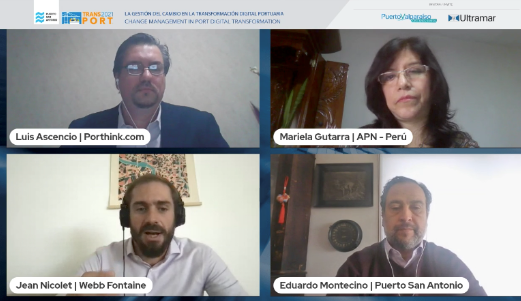The Transport Undersecretary José Luis Domínguez inaugurated the webinar: “Change management in port digital transformation”, organized by Trans-Port, the most important exhibition and congress of the sector in Chile, to be held in Santiago from November 9 to 11. On the occasion, Undersecretary Dominguez stressed that instances such as the exhibition to be held later this year “is a very important event for the development of the port logistics community and we believe that initiatives like these are the ones that will bring us closer and optimize the development of our ports”. Likewise, the government authority said that our country “has to develop a logistics digital transformation policy. This poses a very important challenge to develop technological platforms that must have a national scope”. And he added “the challenge is not only technological, it also requires involving the users, the actors of the logistics chain associated with the Port, because it is key in the coordination of the entire chain”. From the Ministry of Transport, Romina Morales, in charge of Digital Logistics Transformation, stressed that “our Undersecretariat has a role to play as an articulator and promoter of port efficiency and this in a comprehensive manner, in the field of digitization, as one of the axes of digital transformation and in conjunction with the various actors in the logistics chain, we are moving forward in an environment of strategic integration”. And she noted that “we must be clear that the platforms do not work on their own, which is why we are working closely with the port logistics communities, promoting and supporting them in their coordination and sustainability. We also support them in their development plans regarding digital transformation projects”. Panel On the occasion, there was a panel discussion that addressed the challenges of digital transformation in the industry, with the participation of Mariela Gutarra, Digital Government Leader, Chief of Information Technology, Autoridad Portuaria Nacional – Perú; Eduardo Montecino, Deputy Manager of Logistics Development, Puerto San Antonio; and Jean-Edouard Nicolet, Business Development Manager, Webb Fontaine. From Peru, Mariela Gutarra noted that “change management is very important to be able to carry out these types of digital projects, towards digital transformation. And one of the pillars is precisely the people management”. In this context, she indicated that “we are working towards the Smart Port and the impact is wide in each of the stakeholders of the entire port community. In this line she said “we have many challenges to integrate the entire port community (…) It’s not only the implementation of digital technologies, also to have that sustainability, that productivity and work beside the cybersecurity”. Eduardo Montecino from Puerto San Antonio said that “the strategy must add value. Technology alone does not make sense”. And he explained that it “has to cover a space where are improvement opportunities, where adds value to our actors in the logistics chain, where injects competitiveness and where the conditions of the people who work in the logistics community must improve. That is why the human factor is very important, change management to be close and be very accurate in enabling technology to change people’s lives and help them”. Finally, Jean Edouard Nicolet from Webb Fontaine said that “the biggest and most complicated change is a conceptual change in how the community will work. Today almost all public and private actors have a vision of competitiveness with other local actors. And the implementation of community systems is where we are really going to create a community, and there is a change of mentality from competitor to collaborator. Is like to say in a small country economy like Jamaica, or just one port, you can’t only work at your local level and compete among the different companies and understandings, you must collaborate to create efficient environment and demonstrate globally that your value chain is working efficiently. This is one of the biggest impacts and challenges in implementing digital transformation.”
